An interview with Miki Berenyi
The former Lush frontwoman discusses her memoir 'Fingers Crossed', her new band Miki Berenyi Trio, the new wave of shoegaze, touring America, and the 30th anniversary of Lush's 'Split'.
Miki Berenyi will forever be one of the most memorable figures in ‘90s music for me solely for the vivid crimson-coloured hair she sported during her time in the London band Lush. (Thankfully I’m not alone too.) I know how silly it sounds to remember a person - and even more, a band - for some hair, but it was always such a strong, visual identifier for me with Lush. I’m actually grateful for that hair colour, because it was enough to pique my interest in hearing her band’s music. As a 14-year-old, I fondly recall an interview with the band on MuchMusic for the Nation’s Music Station’s Lollapalooza coverage that summer. Their music sounded unlike anything else I’d heard to that point: dreamy, swirling and quite loud at times.
Lush were likely the first shoegaze band I ever listened to. One of the original acts from “the scene that celebrates itself,” their music was celestial and bewitching, with rich melodies that penetrated the layers of reverb. What made Lush unique amongst their peers was having two women - Berenyi and Emma Anderson - up front, as the singers and songwriters, with the men - Chris Acland and Phil King/Steve Rippon - in the back, holding down the rhythm section. Alongside Cocteau Twins and the Breeders, Lush were one of 4AD’s flagship acts, and in their decade together they released three albums (and two compilations in Canada, at least) that saw them traverse the shoegaze and dream pop scene and find some chart success when they tried their hand at (Brit)pop.
Sadly, Lush came to an end in 1996 following Acland’s unexpected death. Berenyi was the only surviving member not to pursue a career in music, but she did join Anderson, King and Elastica’s Justin Welch for a brief reunion in 2016 that resulted in an EP, Blind Spot, and a tour (my then seven-year-old daughter reviewed their Toronto date for Vice). After that abruptly ended, Berenyi and her partner K.J. "Moose" McKillop (a former shoegazer in the band Moose) formed Piroshka, a band that shared a lot of the same traits as Lush did in their final years.
Berenyi is also one of the first visible musicians of Asian descent that I can remember listening to as well (her mother is Japanese, her father was Hungarian). As a teen that didn’t register much with me, but having read her recent memoir, Fingers Crossed: How Music Saved Me From Success, I have since learned of the challenges she faced growing up as a biracial kid in England.
As a devourer of music biographies, I can’t recommend Fingers Crossed enough. Berenyi’s book transcends the genre with a personal account that is absorbing, heartbreaking and at times shocking, making it far exceed the standard narratives that fill standard music memoirs. The bits about Lush almost feel like an aside, but any fan of the band will enjoy how she details their rise through the indie ranks and ability to survive in a competitive UK music industry.
Because of all the book tours and speaking appearances that were booked to promote Fingers Crossed, Berenyi formed a new band with Moose and Oliver Cherer simply called Miki Berenyi Trio. They recently released their first single “Vertigo,” and played select dates across the U.S. During their stop in Nevada, I had the pleasure of speaking with her about what she’s been up to, as well as looking back at my favourite Lush album, 1994’s Split, which turns 30 years old this month.
How has the trip to America been so far?
Oh my God. It's chaotic, but it's great. I feel so much better because we played L.A. last night. My mom was at the show and it was really, really, really great. That's kind of the fucking point of why I'm here. So as long as that goes great, I can deal with everything else.
That’s nice your mom was there to see you play.
Yes, she's very excited. And it's very sweet, actually.
It’s funny. After reading your memoir, Fingers Crossed, I kinda feel like I know your mom. Do you get over here to see her often?
I was over in January. I took my son with me. And that was the first time I've been since COVID, actually. So, that was quite nice. Actually, it was lovely. I sort of forgot because you get a bit blasé when you come over all the time. And when it's family holidays, and it's really stressful, you're just nitpicking. So it was actually nice to come and just hang out with my son. He’s obsessed with American fast food. So we had to go to Chick-fil-A and we had to go to In-N-Out. All of these different places, but it was really good fun.
I noticed you've been covering Lush and Piroshka songs in your set and I was wondering how it feels playing them with a different band?
I mean, it was fine because basically the only reason we started playing the Lush songs was because of the book. And invariably, if you're a musician and it's a book event, they're like, “Can you play some songs?” And I just can't do that on my own, acoustic-y, whatever. So me, Moose and Ollie thought for the launch at Rough Trade we would play four Lush songs. It was really basic and then we sort of kept doing that. And then I guess we just thought this is actually quite good fun. So then it was, “Maybe we should just write music together and start a new thing.” And then in the middle of this, I was getting booked and the sets were getting longer, like, “Oh, can you actually play for like 25 minutes?” And then we got offered the Wedding Present show as a support. So we were frantically trying to write new songs. Basically I didn't really want to just go out and be a Lush covers band. So the more songs we write, the more of the old stuff gets pushed out. There is a kind of ballast really to be able to play shows because we won't have an album out till next year.
I will tell you what's sort of weird about playing the Lush songs is that there's no drummer, so it has to be this really nimble thing. Otherwise, we just wouldn't be able to play it really. So it’s just the three of us with backing tracks. With Moose on guitar, he kind of adds his own stuff. I said, “Don't try and pretend to like play the same song.” There's no point because there’s no Emma there to do the backing vocals. So we just approach them as though we're covering them, and play them how it works as a three-piece rather than trying to be really true to the original. With the backing tracks they are a bit different, as there are different tempos, sometimes different keys, whatever.
I was disappointed that you weren't able to make it up to Toronto for a show.
I mean, I would have loved to have played Toronto, but even this tour was the same sort of runway round planning. So because we got offered this, the thing that I'm playing tomorrow, which is in the middle of nowhere, it's this Schellraiser Festival, they just offered that out of the blue. And we were like, “Okay, they're offering enough money for us to be able to do that.” And then the tour got booked around it. So it's disorganized. If we'd had an album out I would have wanted to play North America properly, and Toronto would have been involved. But because it started from this weird left field kernel, it was like, “Oh, well, we can at least do this.”
So you mentioned an album, possibly next year, does that mean you have enough songs?
We've got about seven songs now. And again, just to fit in with the vibe, you know, we released this track “Vertigo” a few weeks ago. And it's just gonna be that track for now. And people are like, “Oh, is the album coming soon?” But no, it's just because we were playing America and it seemed like a good idea to put a track out just so that it didn't look like we were just a Lush covers band. [“Vertigo”] is just gonna be on its own for a while.
“Vertigo” feels like a continuation of the music you made with Piroshka and Lush, which I’m quite happy about. Sometimes an artist will sound very different when they begin a new project. How did you approach writing for your new band?
I think probably the biggest thing was not having a drummer and think, “Okay, rather than treating that as a lack, it would just be a feature.” So I think the programming has become a bit of a thing. I mean, I'm not particularly great at it, but it's quite fun experimenting with it. And I’m using keyboards and effects and things like that, but I'm a bit of an amateur really. So even the idea of doing a 180 musically, I'm not really capable of it. You know, it's the way I write songs. This is the way I sing. I'm not going to be able to come out with some heavy metal band, because I'm just not a good enough guitarist, for a start. It's always going to be the 12-string and there are always going to be those chords. But I think there are a few interesting songs in the new set. So I wouldn't flatter myself to think that I've got this newly expanded horizon. But that would have taken a veer off at some point, if [Lush] had carried on all those years, do you know what I mean?
You’ve had a lot going on so far this year. You're putting out new music, the book got a release in North America, and then of course, there were the recent Lush reissues through 4AD. As you might know, shoegaze has found a new audience in Gen-Z. Looking back on it now, do you think that the Lush reunion was a few years too early?
So to be honest, the genesis of that Lush reunion, there were a couple of times I was completely cut off from music completely. Phil was playing in the Jesus & Mary Chain and Emma was working at a booking agent at the time. So she was always involved with that kind of music world. But I knew nothing about it. I remember there were a couple of suggestions, like, “Such and such is offering this and maybe we could do that.” My kids were really small then, and it was just such a headache to even think about it. But by the time it was 2016, I just remember Emma going, “I think you should go on social media.” Because I was a bit like, “What was the fucking point? Who gives a shit about Lush?” And I wasn't on any social media. But she noticed there was quite a lot of interest. And I didn't even know about Slowdive reforming, you know what I mean? I think I actually ended up chatting with Rachel [Goswell] around that time. And I was just kind of a bit blown away, you know, that they were playing these shows and that people were even interested.
I do remember Graham Bendel wrote a piece in The Quietus that was like, I don't know, the 20th anniversary of whatever the fuck. They put up this article on April Fool's Day. And he was eulogizing about Lush and saying, “I actually preferred them to My Bloody Valentine.” A slightly controversial take. And literally when that article went up I could see all these comments like, “Oh, it's April Fool's Day, you know, Lush was shit, blah, blah, blah.” And I thought, “Oh, here we go.” I thought, “I fucking knew it. This is how it always goes.” What was interesting about this was when America started to wake up, all the comments started coming in, like, fucking loads of them, saying, “Oh, my God, I love Lush!” Like, blah, blah, blah, to the point where half of those bloody writers who had posted shitty comments by evening time UK, they were like, “Oh, I was only joking.” And I thought, “Yeah, fuck you.” But it did make me think, “Bloody hell, there are actually people who kind of remember it and like it.”
So, I mean, if I'm completely honest, the reason we actually reformed was largely because I thought it was really nice that there were actually people who wanted to hear us. With Slowdive it wasn't just a cash grab, they had new records out and they were enjoying themselves. And I thought, “Okay, this is more interesting than I thought it would be.” I just thought when it was presented to me, it was a bit of a, “Let's get the old band back together and make a bit of money.” I'm wasn’t interested in that. I've got kids and had a job and I just couldn't be bothered. But when it can’t just be about the money, you have to find something else that engages you in order to do it. And I think, you know, the relationship with me and Emma, in particular, was always very tricky. So that was partly why I was not massively keen on it. Because at the time we were talking again and I felt that if we get back this band back together, it could all go wrong again. Which of course it did. I was right.
Well, I really liked the EP that you guys released.
Yeah, and that was really good fun. When we were writing and recording that, everyone was getting on great. And it was really nice to be back in the studio. I'd sort of forgotten how much I enjoyed it, because I hadn't done it for 20 years. And without that Lush reunion tour I wouldn't have written the book, and I probably wouldn't have gotten back into music. So it was a great thing to do.
Obviously you and Emma both have your own solo projects going now, which fans like myself are very excited about. Have you noticed an influx of new fans discovering the music through this newfound interest in shoegaze?
I tell you what, the young people who attend the shows stick out like a sore thumb. But I'm very grateful to see them. Like last night in L.A., there were these three girls who were waiting afterwards to get autographs. And they were very young and very sweet and very starstruck. I couldn't really convey how much it meant to me to have someone under the age of 50 there. It was great. Now and again I see them, but there's not loads of them. I have heard that Slowdive had huge numbers of very young fans.
I took my daughter to see Slowdive when they played Toronto last fall.
Right. We're not quite at that stage. There is still a large proportion of bald men. But I'm very grateful for the flurry of younger people who turn up. And also there are quite a few women who were maybe teenagers when Lush were still together. They're not as ancient as I am, just turning 40 or something. So that's quite sweet.
Last year I remember reading a piece in The Guardian about how music memoirs are a booming business right now. I read every one I can get my hands on, it doesn’t really even depend on who it is. But it’s nice to hear I’m not the only one reading them. How surprised have you been at the level of interest in your book?
Massively. I mean, honestly, I just thought when I was approached to do it the book was going to sink without a trace. But it was during COVID and my magazine I worked for folded. So it wasn’t the best time to look for a job. I just thought, “All right, fuck it. I'll do it because I was approached.” But I didn't for a second think it would do this well. So it's again, great, a lovely bonus. I'm not much of an instigator. I wouldn't have written the book if I hadn't been approached. I wouldn't have done the reunion if I hadn't been approached. I wouldn't have done Piroshka if Justin hadn't been in Lush and gone, “We should do some music.” I think it's always a bit of a surprise. Like I can't believe I'm in fucking America right now. It is quite a good tactic to set the bar quite low because it means you're very easily pleased.
As someone who spent their teens in the 1990s, it was an absolute joy to revisit that period especially through Lush. Your book was different from others I’ve read though. I found the band’s story fascinating, but learning about your childhood was a lot more harrowing than what I expected. Oftentimes a memoir’s childhood story acts like an appetizer. When did you realize your life would make for such a compelling read?
I think, because I don't actually read a lot of music biographies, when I was asked to do it, I did kind of get a load and start reading them. I had a friend who writes these sort of books and she said, “Look, just start at the beginning and write it. There's no point in trying to get all clever and thematic about it. Just vomit it out and then edit it. That's the way to do it.” So I got started and got quite into it. And my editor actually did say, “Normally we don't have two or three chapters on childhood, but it's actually quite compelling.” So he said, just carry on as, as you are. It wasn't even a deliberate choice. It was just that I didn't really know what I was doing. I didn't really have a format in mind. So I was writing with a lot of encouragement and if I'm honest, the bit about the band was always going to be difficult anyway, because Emma doesn't speak to me and Phil doesn't speak to me, and it's all a bit problematic. I'm not even saying that in a “poor me” way, but it makes things quite difficult. You have to write about that stuff and in order to be honest about it, it is quite a delicate tightrope to walk, to not sound really bitter and upset. So that's why maybe the childhood stuff kind of spiraled because that was a lot easier to write about and less fraught in a way. I know it's got like fucking really difficult things in there, but I don't know, that’s sort of in the past.
Split turns 30 years old in a couple of weeks. It’s my favourite Lush album. And I wanted to know if the title came from having the two different songwriters or through Vaughan Oliver’s artwork?
I think that I do remember seeing the kind of the images that Vaughan had, but the two songwriters, I think, I don't know, I'm sort of trying to immerse myself back in that moment really. I do remember saying to Emma, “Oh, God, are you sure it's a good idea?” Because we always got so much grief from the British press. She said they were just going to go laugh, like, “Split? If only the would!” But I think a lot of it was from the artwork. We were always really bad with titles in that, I mean, you know, I remember. They were often very much at the last minute, which is still the case with me. Emma was better with. I know that after when we did Lovelife she said, “Oh, I really think that would be a good album title,” even though the song “Love Life” was on Split.
Also because there were two songwriters and because of the way we wrote, there was never really a concept. There wasn't really that kind of thought. It was just like, I've written a song, she’s written a song, I've written a song, and then they just got bundled together. I think therefore coming up with an overarching, you know, album title that captured both of the different stuff going on in our own heads with our own lyrics was always quite tricky. And that's why it was always very last minute. There was more of a word association thing going on. The other meaning was that there were relationships and those sorts of splits going on. Like fractured relationships and parental and romantic stuff. All of that sort of added meaning.
Based on what you wrote in Fingers Crossed and what you told Merton Aston in his excellent 4AD book, Facing The Other Way, the band weren’t too happy with Mike Hedges’ production. I think Phil said it sounded “as flat as a pancake”?
I respect Mike. What I'd say is that we were quite naïve. You're sitting there and you're going, “Oh, he's done the Cure and Siouxsie and the Banshees. Let's work with Mike Hedges. It will be amazing.” And actually a lot of people have since kind of commented that Mike Hedges is brilliant. He's more of an engineer, but he's very, very brilliant at it. I feel a little bit bad towards Mike because, you know, Split wouldn't have been the record it was without him. But I think that it just went on way too long. And that is when you rely on managers and record labels to help you out. We were slightly coerced into going to mix with him at his studio. And it was a mistake. It was not a pleasant experience. I don't think he enjoyed it either. It was far simpler to just do the recording and then get someone else to mix it. We could have done it in London and it would have been a much easier process. But I think he did that with the Manic Street Preachers [Everything Must Go], which is an amazing album. And that was mixed by other people mostly.
You called Split “out of step with the times.” Did it feel like Lush was in a tough spot, in between the fade of shoegaze and the rise of Britpop?
Well, in Britain for sure. Absolutely. And also shoegaze really was shot down right at the beginning. It was mostly Melody Maker that really supported shoegaze. But these were weekly magazines and they turned over bands very quickly. Even by the time Spooky came out we were getting slagged off in Britain. So by the time Split came out, because it's a very introverted record, putting out something like “Desire Lines,” which is one of my favourite Lush tracks, it just wasn't really the zeitgeist. Bands like Elastica and S*M*A*S*H and These Animal Men were emerging at the time, the pre-Britpop acts. And so Split got panned, and it did absolutely fuck all in Britain. I think that should have been in the cards.
Why do you think the album was received so much better here in North America?
Possibly because, and this is going to sound really asinine, but because it's so vast as a country. It takes longer for things to percolate here. Whereas in Britain things can be over in like six months. It's intense. But in America, once you've got a bit of momentum, it lasts a bit longer. It takes so long to even get heard of in the first place, but in Britain you could form a band and in three months get a feature in Melody Maker and a cover three months after that. So it's a bit easier to come and go, whereas in America, you have to kind of work your ass off to even get anywhere. But once you've established yourself even a bit, then you're not quite so easily discarded.
In Fingers Crossed you mentioned how your A&R guy tried pushing you into endorsing an exclusive Manic Panic colour called “When I Dye” for the song “When I Die,” which Emma wrote about her father’s death. That’s unbelievable! What was your response to that?
Yes. I mean, bless him. I think this was in the middle of mixing Split when everyone was having a complete spiral, you know, it was a really bad time. And yeah, and I think, I mean, blessing him, I think he struggled with addiction issues. I did wonder what was going on with him. But yeah, he said, “I've got an idea, you know, I could put it to the marketing department.” And I think Emma was just like, “No. I think that's in rather poor taste.”
I remember Weezer were the support band for your 1994 North American tour. From a 1990s alternative standpoint it wasn’t all that strange. But now looking back it does seem rather strange pairing those two bands together for a tour. What do you remember about touring with Weezer in 1994?
I can't say a lot. But that oddness of mixing bands was probably suggested either by the agent or by Warners. So it wasn't like we even knew who they were. And that's often how those tours were put together. I mean, before that we toured with the Flaming Lips and I had no fucking idea who they were. But we met them and we got on with them. I think musically, these odd pairings never bothered me because I was actually really into that.
I loved the idea of touring in Britain with a band like Gallon Drunk. I guess the more predictable tour pairing was when we toured with Ride, which was extensive. But that was so convenient. And I do think back then, in that period, and it wasn't alternative music yet. I think people were a bit more open to seeing different types of bands playing together.
The fact that we were on Lollapalooza, I didn’t think we were going to get on with Red Hot Chili Peppers fan, but it's not like they were booing us. I think that very rigid idea, the kind of fracturing of alternative music where you only listen to this kind of music or that kind of music came quite quickly, soon after.
But Weezer were clearly on a rising trajectory and becoming immensely popular. I liked it enough and we got on with them. So I didn't really think about it that much, like, “Why are we on tour with this band?” I guess compared to something like the Shaving The Pavement tour that probably made more sense to fans, but obviously a lot of tours weren't designed like that one. I mean, this is the current predicament, where as much as I would love to tour America, it's really fucking expensive. So when you've got a major label like Warners behind you, well, there's your tour support, you know, they'll sort everything out, they'll pay for equipment and visas, hire crew, buses and all sorts. Yes, you end up having to pay that back, which often means they will go, “Well, we want you to go on tour with one of these bands,” and they will suggest whoever the fuck they want and you just make the best of it.
I just don't think we were in a position to do a tour and go, “We don’t want this support band, we want one we like from England.” That's not the way it worked. They called certain shots on that, but it didn't really bother me. I mean, it got crappy by the time Lovelife came out because putting us on tour with the Gin Blossoms and Goo Goo Dolls didn't work because it was just totally the wrong audience. It really was an audience that just wasn't interested in us. But I think there were people in the Lush audience who really enjoyed Weezer. So I didn't get loads of people going, “Why are you on tour with this shit band?” So I'm guessing it was fine.
Finally, what can you tell me about the new Lush documentary, A Far From Home Movie?
Phil put the film together originally for the ten-year anniversary of Chris’s death in 2006. There was an event organized in the Lake District where Chris grew up, where his old punk bands played and the Lush contribution was this film. It was very moving to see it shown on a big screen with so many people who loved Chris and missed him terribly.
What do you remember about shooting all of that Super 8 footage on tour?
It’s a lovely film and I’m pleased for Phil. He was forever filming on his Super 8 on tour and has a real eye for it. Even inspired me to get my own Super 8 camera – though my efforts were much less impressive!
For more on Lush, I highly recommend checking out the Chorus Line microsite 4AD launched featuring an oral history on the band and all of their albums.



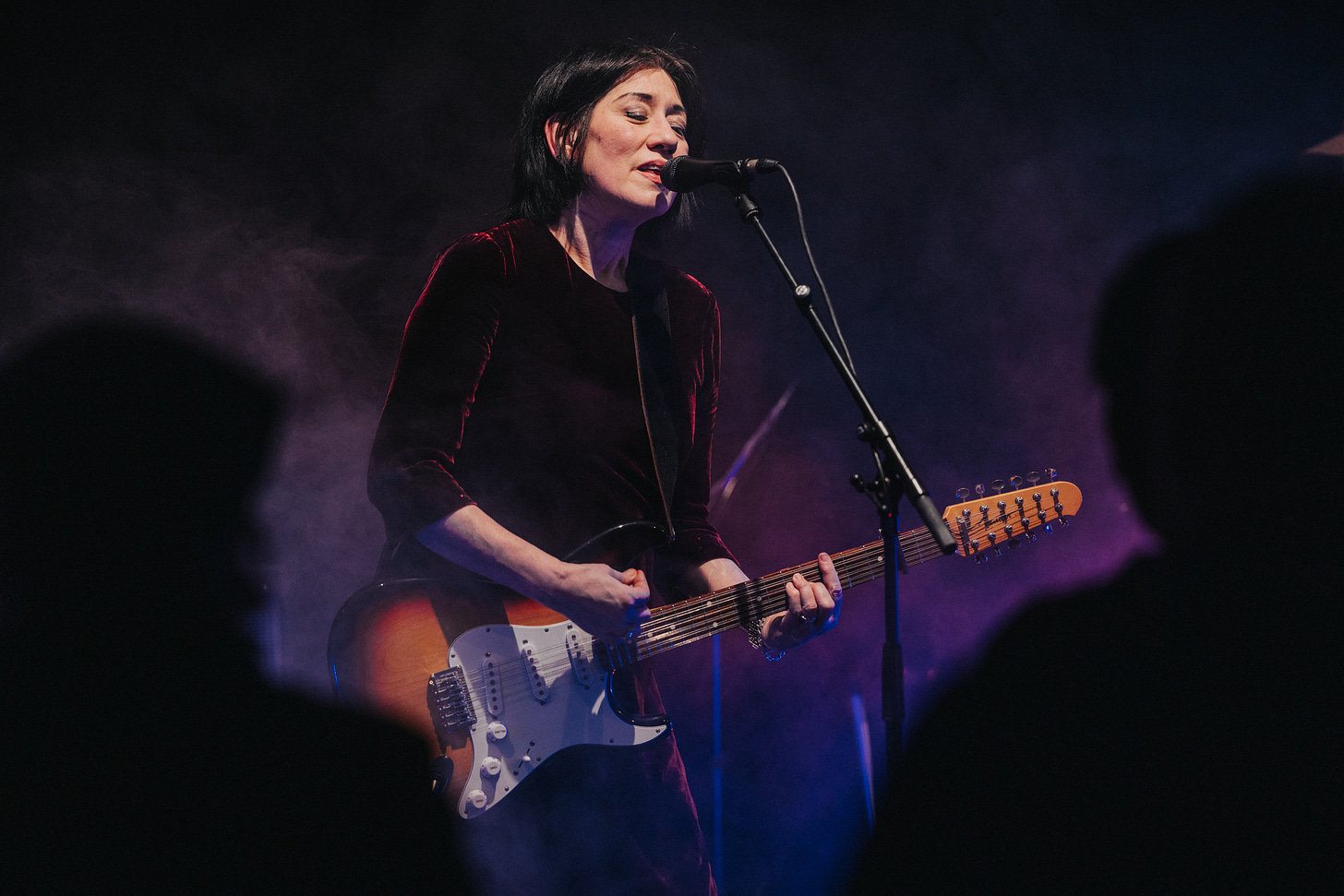

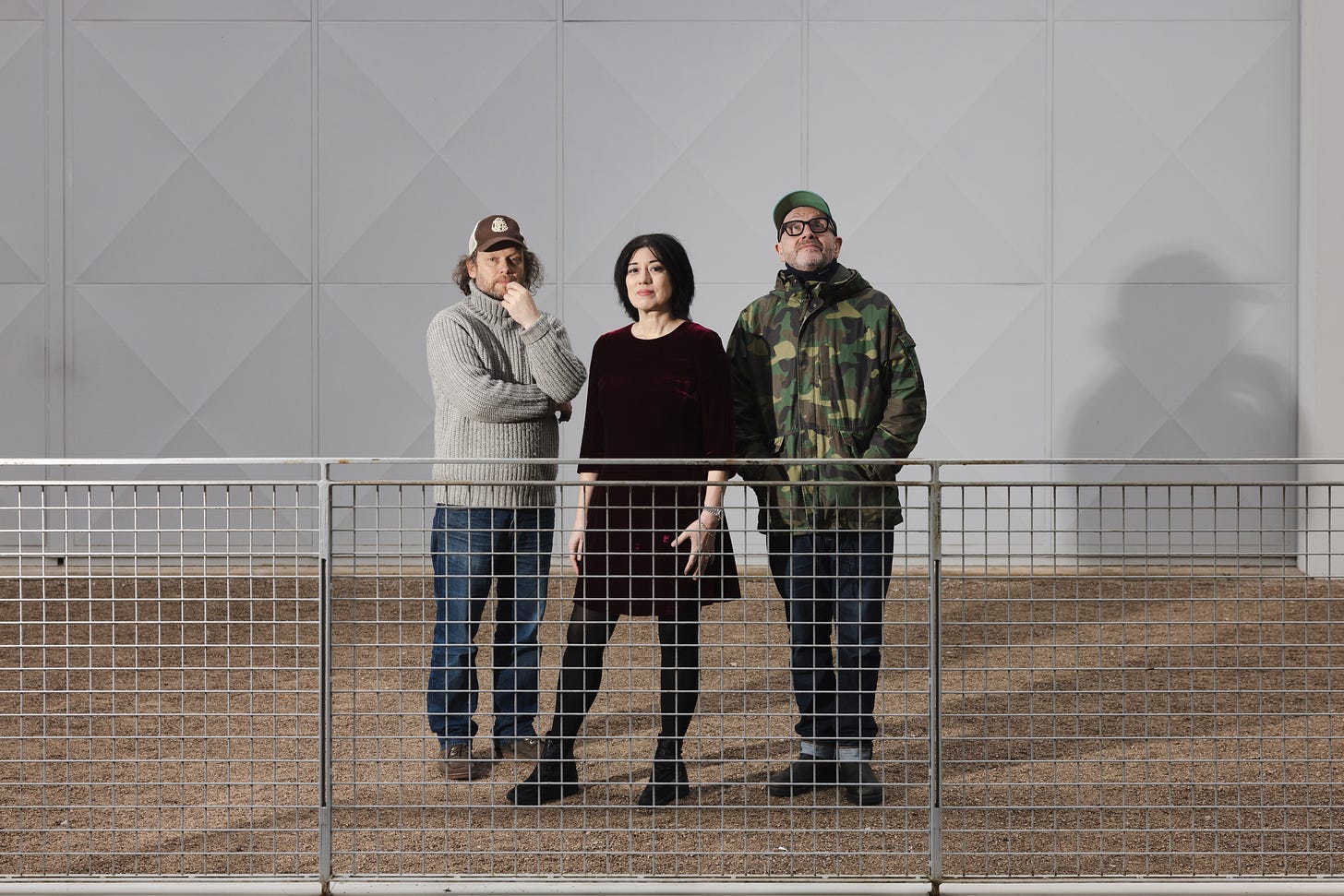
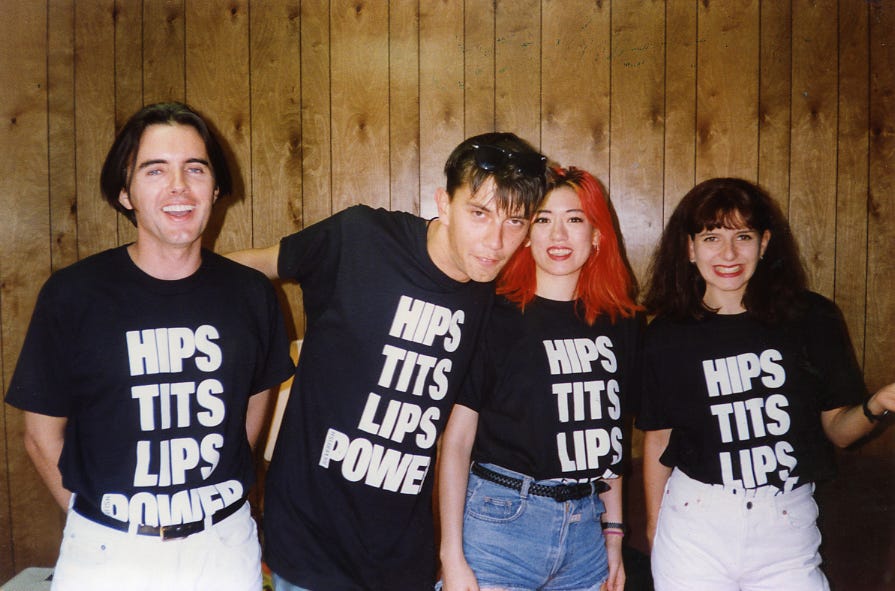


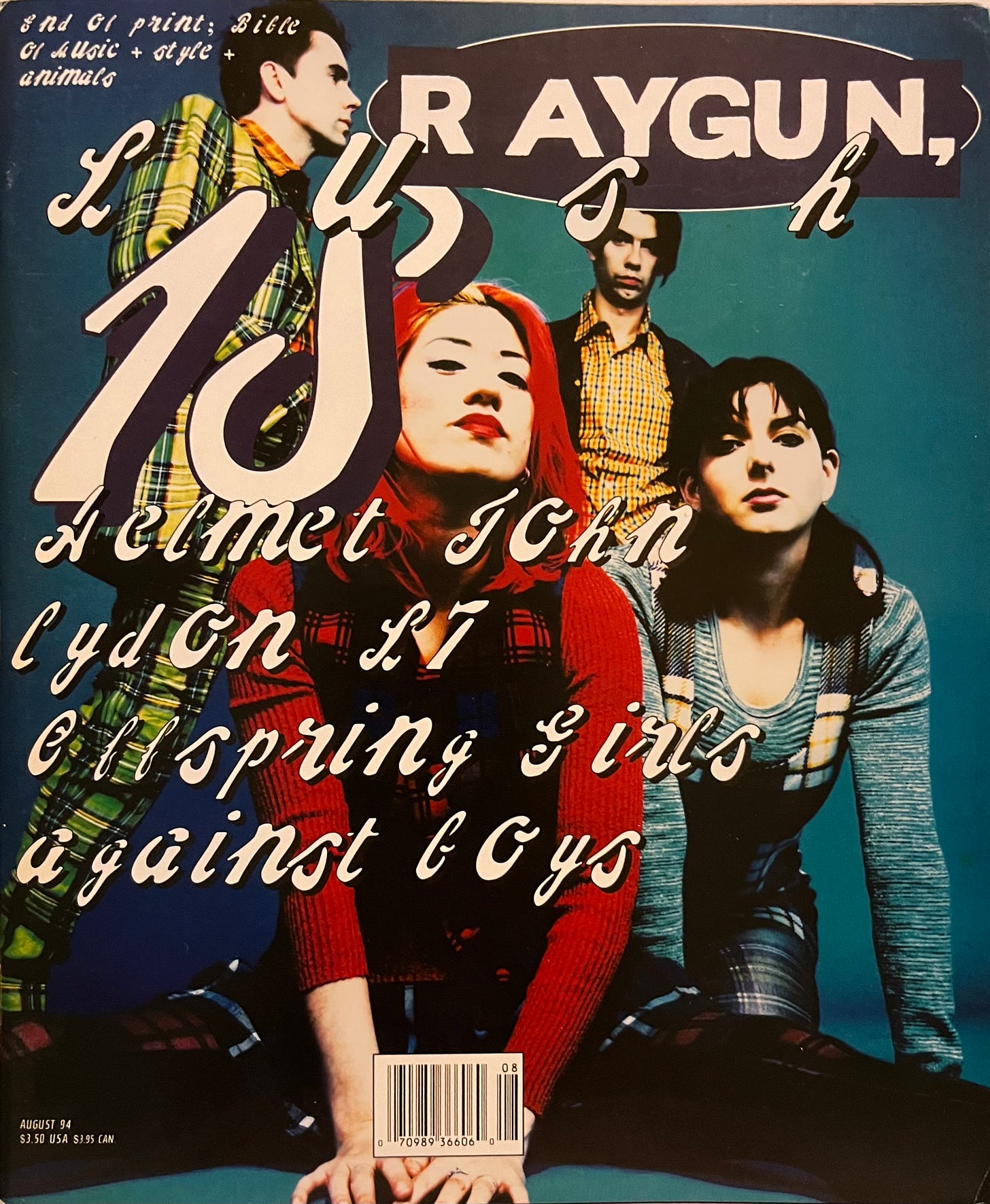
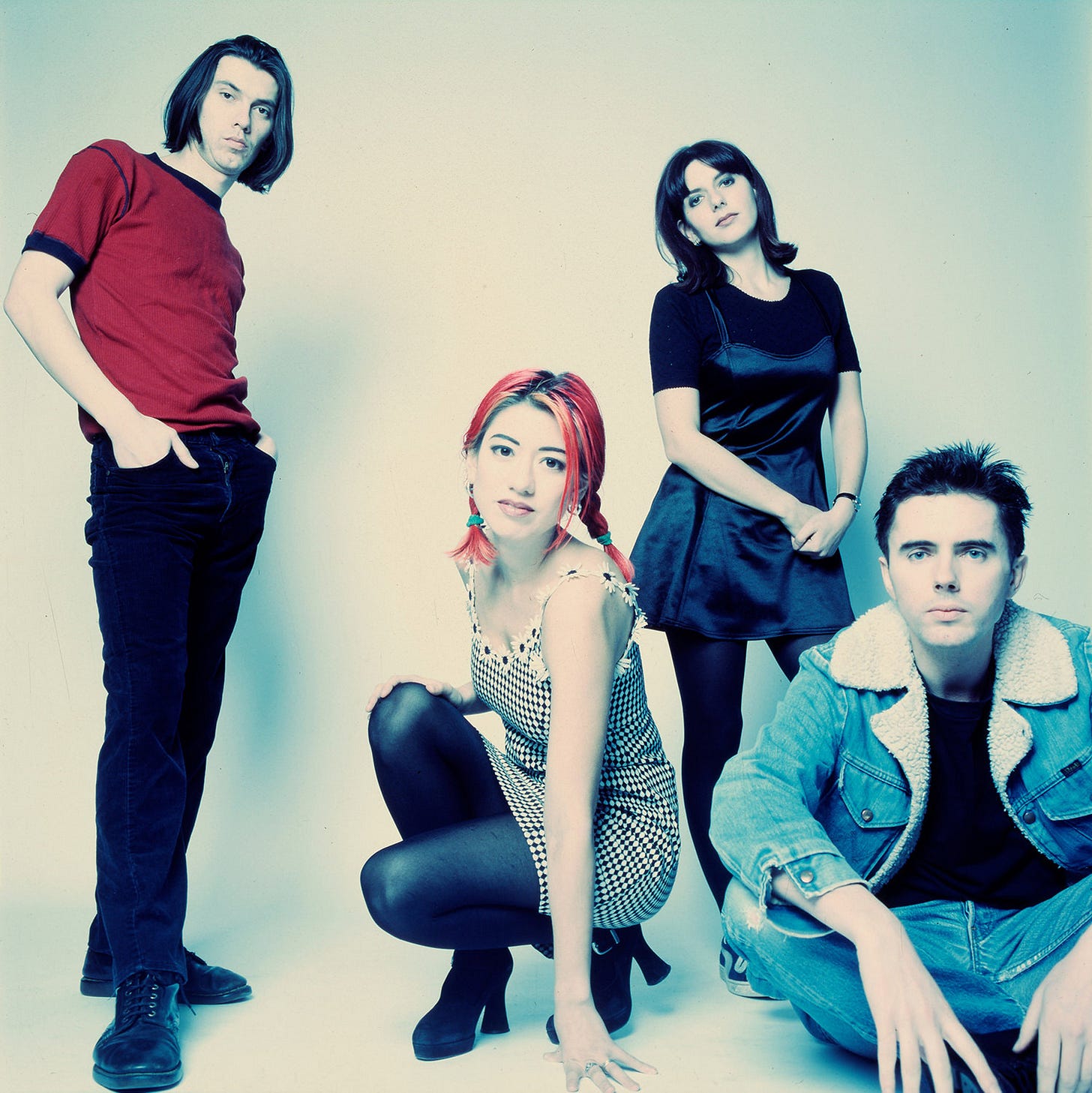
Great interview--thanks! I, too, wish she'd come and play in Toronto, and Emma also, for that matter.